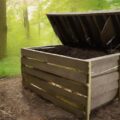Why Composting is Important
Composting is an essential practice for sustainable living. It helps reduce waste, enriches the soil, and lessens the need for chemical fertilizers. By composting, you can contribute to a healthier environment and create nutrient-rich soil for your garden.
Understanding the Basics of Composting
Before diving into the best foods to include in your compost pile, it’s important to understand the basics of composting. Composting is a natural process of recycling organic material, such as food scraps and yard waste, into a valuable fertilizer that can enrich soil and plants.
Types of Compostable Food
Not all food scraps are created equal when it comes to composting. Here are the main types of compostable food:
- Fruits and Vegetables: These are ideal for composting as they break down quickly and are rich in nutrients. Examples include apple cores, banana peels, and carrot tops.
- Eggshells: Eggshells add calcium to your compost, which is beneficial for plant growth. Make sure to crush them before adding them to your pile.
- Coffee Grounds and Filters: Coffee grounds are rich in nitrogen, making them an excellent addition to compost. Paper coffee filters can also be composted.
- Tea Bags: Many tea bags are compostable, but be sure to check if they contain any synthetic materials. Compostable tea bags add nitrogen to your compost.
- Grains and Bread: Stale bread and grains can be composted, but use them sparingly as they can attract pests.
Foods to Avoid in Composting
While many foods are great for composting, there are some you should avoid:
- Meat and Dairy: These items can attract pests and create odor problems.
- Oily Foods: Oils can slow down the composting process and attract unwanted pests.
- Citrus Peels: In large quantities, citrus peels can make your compost too acidic.
- Processed Foods: These often contain preservatives and other chemicals that are not suitable for composting.
Tips for Successful Composting
Here are some tips to ensure your composting efforts are successful:
- Balance Browns and Greens: Browns are carbon-rich materials like leaves and paper, while greens are nitrogen-rich materials like food scraps. A good balance is key to successful composting.
- Turn Your Pile: Regularly turning your compost pile helps aerate it and speeds up the decomposition process.
- Keep It Moist: Your compost pile should be as moist as a wrung-out sponge. Too much or too little moisture can hinder the composting process.
- Chop Materials: Chopping or shredding items before adding them to your compost pile helps them break down faster.
FAQ
What is the best way to start a compost pile?
Start with a layer of coarse materials like twigs or straw at the bottom to help with aeration. Then alternate layers of greens (food scraps) and browns (leaves, paper) to create a balanced mix.
Can I compost cooked food?
It’s best to avoid composting cooked foods as they can attract pests and may contain oils and fats that are not suitable for composting.
How long does it take for compost to be ready?
The composting process can take anywhere from a few months to a year, depending on the materials used and how well the pile is maintained.
Can I compost in the winter?
Yes, you can compost in the winter. The process will slow down due to the cold, but it will resume once the temperature rises. Insulating your compost pile can help maintain some activity during colder months.
Is it necessary to buy a compost bin?
No, it’s not necessary to buy a compost bin. You can create a compost pile in your backyard. However, a bin can help keep things tidy and may speed up the process by retaining heat and moisture.









